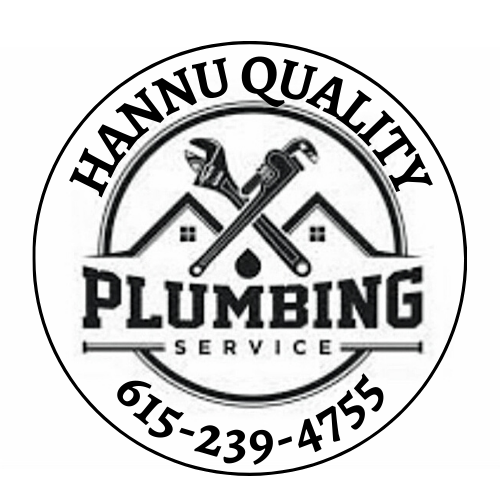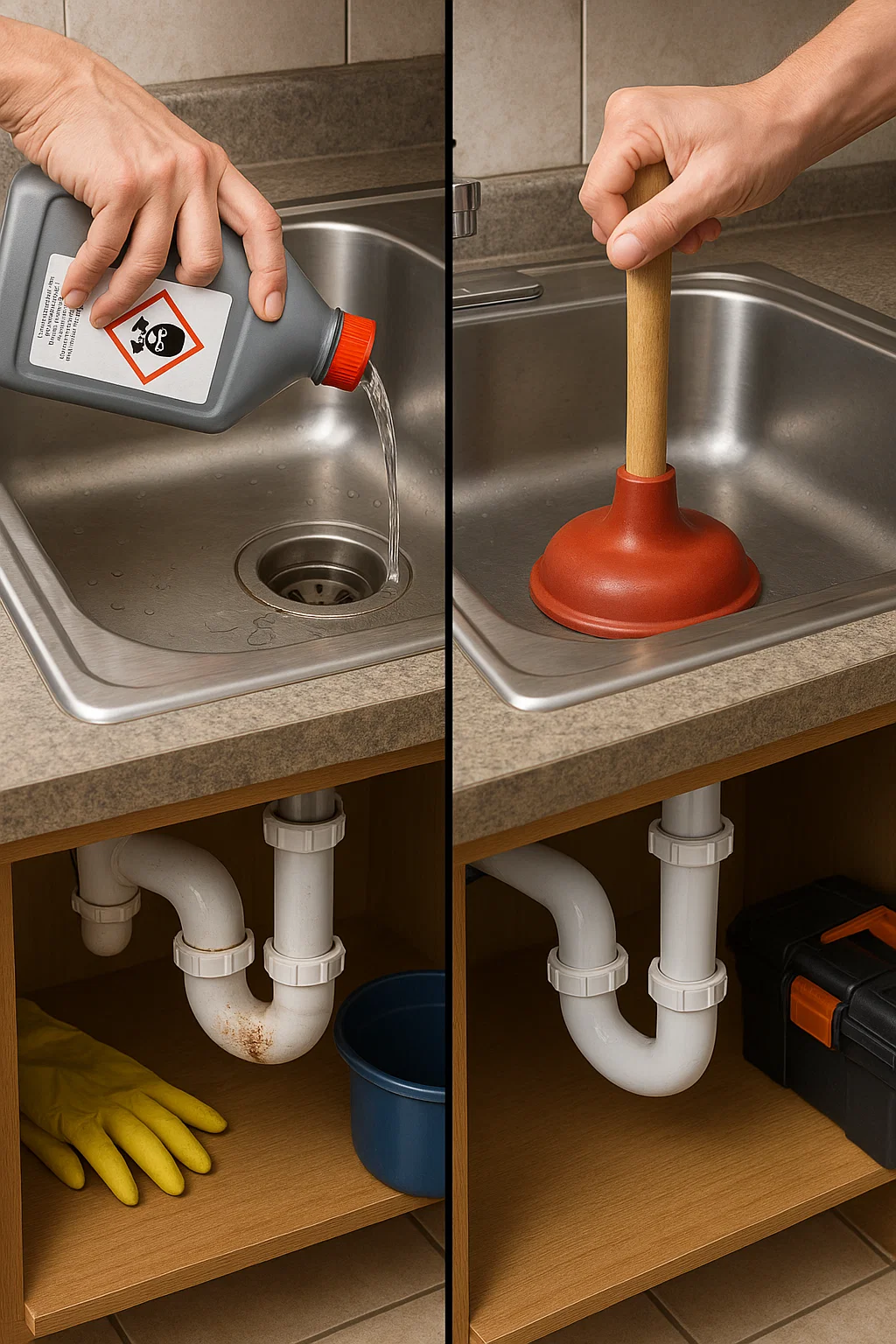DIY drain cleaning might seem like a convenient and cost-effective solution when facing a slow or clogged drain—but not all home remedies are as effective or safe as they seem. While some techniques can help you resolve minor clogs, others may damage your plumbing system and result in costly repairs.
In this article, Hannu Quality Plumbing will walk you through common DIY hacks, evaluate their effectiveness, and highlight methods you should absolutely avoid. We’ll also share professional alternatives and preventative measures to help you keep your drains running smoothly without the risk.
1. Common DIY Drain Cleaning Hacks: Separating Myth from Reality
The Good, the Bad, and the Ineffective
When searching online for DIY drain cleaning solutions, you’re likely to come across a long list of household hacks. Some work—but many don’t.
What Might Work:
- Boiling water: Safe and occasionally effective for grease or soap scum.
- Baking soda and vinegar: A favorite homemade drain cleaner, it creates fizz but rarely removes tough clogs.
- Plungers and drain snakes: Reliable manual tools if used correctly.
What Doesn’t Work:
- Dish soap alone: May lubricate but won’t dissolve significant clogs.
- Hot vinegar flushes: Mostly ineffective and may damage certain plastic components over time.
While it’s tempting to try various methods you see online, how to unclog a drain effectively often depends on the type and location of the blockage.
2. Dangerous DIY Methods That Can Damage Your Plumbing
When Saving Money Becomes a Repair Bill
One of the most harmful DIY drain cleaning habits is overusing chemical drain cleaners. These acidic products can erode your pipes—especially in older systems—and often don’t resolve the root of the problem.
Other risky practices include:
- Wire hangers: May scratch pipe interiors or push clogs deeper.
- Mixing multiple chemicals: Creates hazardous fumes and chemical reactions.
- Forceful plunging: Can cause pipe joints to loosen or crack.
If you’re trying to learn how to unclog a drain, stick to methods that are both safe and proven. When in doubt, consulting professionals like Hannu Quality Plumbing is a smarter investment than risking long-term damage.
For more insight, check out this external list of DIY plumbing mistakes you should avoid at all costs.
3. Safe and Effective Alternatives for Cleaning Drains
What You Should Do Instead
While some homemade drain cleaner recipes offer partial results, here are tested, safe techniques recommended by professionals:
- Enzyme-based cleaners: These are non-corrosive and break down organic material naturally.
- Drain snakes or augers: Mechanical tools that physically remove clogs.
- Wet/dry vacuums: Effective for pulling out loose debris from the line.
If you’re trying DIY drain cleaning but still face recurring clogs, this could indicate a bigger issue in your system. That’s when it’s time to explore professional help. You can start with general plumbing services from Hannu Quality Plumbing for a thorough inspection and maintenance plan.
Additionally, consider routine drain flushing with hot water and enzyme solutions as a preventative measure. These methods are far safer than harsh chemicals and help extend your plumbing’s lifespan.
4. When to Call a Professional Plumber
Know the Limits of DIY
There’s a time and place for DIY drain cleaning, but persistent blockages, bad smells, or slow drains throughout the home often mean there’s a bigger problem. Issues like tree root intrusion, main line obstructions, or collapsed pipes require professional equipment and experience to diagnose and fix.
Hiring a licensed plumber ensures:
- Correct problem identification
- Pipe-safe techniques
- Long-term solutions, not temporary relief
If you’ve tried multiple homemade drain cleaner hacks or studied how to unclog a drain to no avail, it’s time to step back. At Hannu Quality Plumbing, we use camera inspections, hydro-jetting, and expert diagnostics to get your system running properly—without the risk of DIY disasters.
5. Preventative Maintenance Tips for Clean, Healthy Drains
Stop Problems Before They Start
Rather than waiting for a clog to form, consistent maintenance can help avoid the need for DIY drain cleaning in the first place.
Helpful habits include:
- Avoid pouring grease down the sink
- Use mesh drain screens
- Flush with boiling water weekly
- Add enzymes monthly
Educating your household on what not to flush or rinse down drains is just as important as knowing how to unclog a drain. Remember, proactive care is always cheaper than reactive repairs.
You can also consult Hannu Quality Plumbing for annual checkups or cleanouts, especially if your system is older or sees heavy use.
6. Final Thoughts: Smart Drain Cleaning Starts with Safe Practices
Not all DIY drain cleaning hacks are equal. While some can be helpful, others do more harm than good. Understanding what works, what doesn’t, and when to call in the pros can protect your plumbing and your wallet.
Instead of relying on uncertain homemade drain cleaner mixes or damaging tools, trust proven methods—or better yet, let experienced professionals like Hannu Quality Plumbing handle it. From minor clogs to system-wide inspections, we’re here to keep your pipes flowing.
Visit us at Hannu Quality Plumbing to learn more or schedule service today.
FAQs: DIY Drain Cleaning and Safe Practices
1. What is the safest DIY method to unclog a drain?
Using a plunger or drain snake is generally safe and effective. For mild clogs, an enzyme-based homemade drain cleaner can help without damaging your pipes.
2. Can baking soda and vinegar unclog every drain?
Not always. While this method may help with minor build-up, it’s rarely strong enough to remove serious clogs.
3. Are chemical drain cleaners safe to use regularly?
No. Chemical cleaners can corrode your pipes and should be avoided. If you’re unsure how to unclog a drain, consult a professional instead.
4. When should I avoid DIY drain cleaning completely?
If multiple drains are slow, you smell sewage, or you’ve tried multiple methods without success, call a professional immediately.
5. How can I prevent my drains from clogging in the first place?
Avoid pouring grease down the sink, use drain covers, flush pipes with hot water weekly, and use a monthly homemade drain cleaner like baking soda and enzymes for maintenance.




